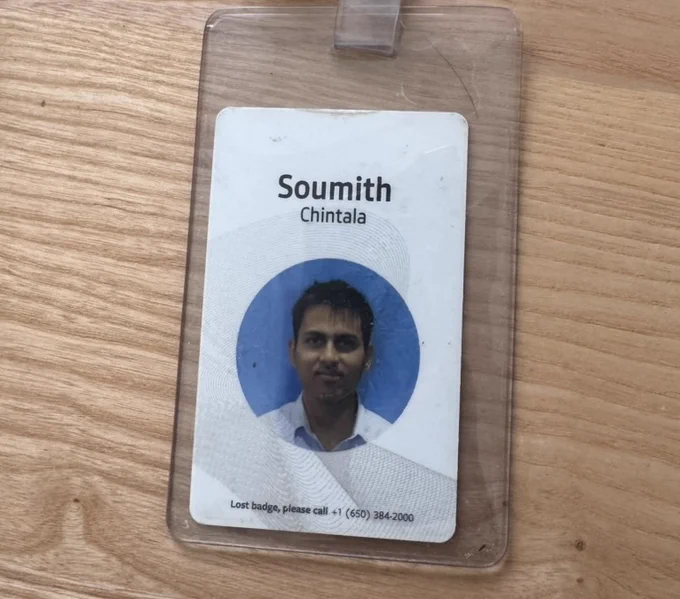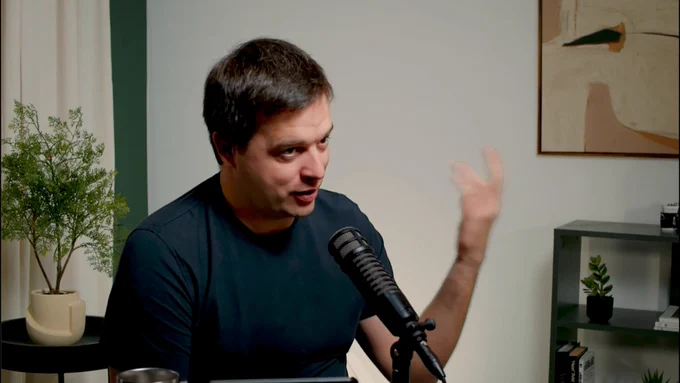My Mastodon: @weichen@econtwitter.net 天安門事件
United Kingdom
Joined May 2017
- Tweets 21,429
- Following 3,577
- Followers 307
- Likes 206,027
Pinned Tweet
A lot of useful advices.
Not only useful for academic career but also for our daily routine.
Lawrence retweeted
A new paradigm for mathematical proof? ~ Emily Riehl. piped.video/fzxW2XJS6SE #AI #Math #ITP #Agda #LeanProver
Lawrence retweeted
A few people have asked for the PDF. I don't think I can release that publicly yet, but the chapters are these 3 papers:
arxiv.org/abs/2309.09814
arxiv.org/abs/2410.06171
arxiv.org/abs/2502.17405
Lawrence retweeted
If you work at the intersection of CS and economics (or think your work is of interest to those who do!) consider submitting to the ESIF Economics and AI+ML meeting this summer at Cornell: econometricsociety.org/regio…
Lawrence retweeted
SIMD throughput on AMD Zen5 is impressive... even on tiny, irregularly sized inputs!
Computing word hashes for dictionary lookups:
• Rust standard lib: 333 MiB/s
• xxHash3: 998 MiB/s
• aHash: 1'159 MiB/s
• StringZilla: 2'241 MiB/s 🦖
Finishing StringWars / StringZilla benchmarks now — those are pretty heavy on masked loads/stores. SimSIMD numerics next — some Turin-only kernels there should really shine!
AWS has announced the general availability of its new Amazon EC2 R8a memory-optimized instances, powered by 5th Gen AMD EPYC processors with clock speeds up to 4.5 GHz.
This means more speed and efficiency at a lower total cost of ownership, without having to change their cloud architecture.
Read more from @AWS: go.aws/47wMThq
Lawrence retweeted
Dear followers
I’m happy to share the video of a panel I did with Paul Krugman, Danielle Li and Zeynep Tufekci at CUNY last month on
AI and the Future of Work piped.video/McYBgZrORi4?si=11lO… via @YouTube
Lawrence retweeted
Maryland's "Mathematical Logic" notes
by David W. Keuker
PDF 1: math.umd.edu/~dkueker/712.pd…
PDF 2: math.umd.edu/~dkueker/713.pd…
Lawrence retweeted
Economists for decades: Results proving free trade aren't novel, we have known that since 1776. Rather, we will train generations of graduate students entirely in identifying exceptions to free trade based upon the assumption that if politicians are platonic philosopher kings, with perfect knowledge and incentives, then there are theoretically possible, albeit highly implausible, conditions under which tariffs could improve efficiency.
Economists today: Where did all this support for protectionism come from?
Lawrence retweeted
Video lectures, UMD Maryland CMSC 828W Foundations of Deep Learning fall 2020, by Soheil Feizi
cs.umd.edu/class/fall2020/cm…
piped.video/playlist?list=PL…
.
Lawrence retweeted
Leaving Meta and PyTorch
I'm stepping down from PyTorch and leaving Meta on November 17th.
tl;dr: Didn't want to be doing PyTorch forever, seemed like the perfect time to transition right after I got back from a long leave and the project built itself around me.
Eleven years at Meta. Nearly all my professional life. Making many friends for life. Almost eight years leading PyTorch, taking it from nothing to 90%+ adoption in AI. Walking away from this was one of the hardest things I've ever done. But I'm leaving with a full heart.
PyTorch handles exascale training now. It powers foundation models that are redefining intelligence. It's in production at virtually every major AI company. It's taught in classrooms from MIT to rural India. The tools I dreamed about making accessible? They are. The barrier to entry I wanted to lower? It's almost gone.
To be clear, there’s so much more to do. As long as AI evolves at a breakneck pace, PyTorch will continue to play catch up. Obsessing over the yet-to-come sometimes makes us forget how much we’ve already done.
To everyone who built this with me—who believed research should be joyful, that tools should be elegant, that open source changes everything—thank you. This wasn't my journey. It was ours.
What's next for me? Something small. Something new. Something I don't fully understand yet. Something uncomfortable. I could have moved to something else inside Meta. But I needed to know what's out there. I needed to do something small again. I couldn't live with the counterfactual regret of never trying something outside Meta.
It's very hard to leave. I probably have one of the AI industry’s most leveraged seats, I lead the software layer that powers the entire AI industry. Every major AI company and hardware vendor are on a speed dial. This kind of power is really hard to give up. But curiosity ultimately won out in my head.
Keep making AI delicious and accessible. I'll be watching. Probably filing issues. Definitely staying involved.
Is PyTorch going to be okay?
I don't want to be doing PyTorch forever. I don't want to be like Guido or Linus— bound to a single thing for decades. Last November, coinciding with the birth of my daughter, I started planning my exit with Aparna. My goal was to leave PyTorch in a good and stable place.
By this August, during the second half of my parental leave, I knew: Edward, Suo, Alban, Greg, John, Joe and Jana were ready. The team faced hard people, product, technical and organizational problems and didn’t feel the need to lean back on me to solve these for them (unlike in the past). The product story they crafted for the PyTorch Conference was coherent—really coherent. The things I'd flagged red were turning healthy. The project didn't need me anymore. Unlike 2020-2022 (when I stepped down to go do robotics and came back when Lin, Dima and Dwarak left), I have strong confidence that this time PyTorch is truly resilient. The most aligned culture carriers of PyTorch – Greg, Alban, Ed, Jason and Joe are at the decision table now, and people with strong value alignment – Suo, John and Jana have joined them at the table. And there’s a long list of equally value-aligned people willing to sit at the table should any of these people leave. There are many little things that make up my confidence on the people – John worked on Julia and open-source for a very long time (in fact we hacked a Torch.jl in 2015), Suo has been the strongest systems builder and strategic partner I’ve had for the past two years, and Jana worked on resilient core systems for a very long time, I’ve had long technical and organizational discussions with her over the past few months that give me confidence. And the product lineup and execution in 2025 should be sufficient evidence for any remaining doubt.
I’m confident that this band of PyTorchers are going to do exceptionally well. PyTorch might change in flavor because I no longer impose my own taste from the top, but I’m confident that the values are going to stay intact and the product is going to be awesome.
My time at Meta
The early years of FAIR were absolutely magical. I was part of a small family of absolutely brilliant people building state-of-the-art AI out in the open. From working on GANs with Emily Denton, Rob Fergus, Leon Bottou, Martin Arjovsky and the (now legendary) Alec Radford to building Starcraft bots with Gabriel Synnaeve, to building the first FAIR Cluster with Howard Mansell, to working on object detection with Adam Lerer and Piotr Dollar, to building PyTorch. It was more fun than I can describe in words. 2015 and 2016 were probably the most productive and professionally enjoyable years of my life. I’ll probably romanticize this period of my life forever.
When I joined FAIR, I had massive impostor syndrome, and the first 3 months were very very difficult. I can’t credit Andrew Tulloch enough for being the most thoughtful, kind and welcoming mentor, without whom I wouldn’t have made it. I’m so damn bullish for Meta just from the fact that he’s back.
---
My time on PyTorch was special.
I loved every part of building it—designing it, managing it, being the PM, TL, comms lead, doc engineer, release engineer, squashing bugs, growth hacking, turning it into a coherent product with hundreds of people, transitioning it to industry stakeholdership – the whole nine yards.
To the core PyTorch team at Meta: the engineers, researchers, open-source maintainers, docs writers, CI infrastructure folks, hardware partners, the community builders. To the hundreds more inside and outside Meta—thank you. You turned a library into a movement.
There are too many people to credit and thank, but I can't not mention Adam Paszke, Sam Gross, Greg Chanan, Joe Spisak, Alban Desmaison, Edward Yang, Richard Zou, Tongzhou Wang, Francisco Massa, Luca Antiga, Andreas Köpf, Zach DeVito, Zeming Lin, Adam Lerer, Howard Mansell and Natalia Gimelshein. And Schrep. They made the launch happen. And so many more people became centrally important later: Lu Fang, Xiaodong Wang, Junjie Bai, Nikita Shulga, Horace He, Mark Saroufim, Jason Ansel, Dmytro Dzhulgakov, Yangqing Jia, Geeta Chauhan, Will Constable, Briah Hirsh, Jane Xu, Mario Lezcano, Piotr Balecki, Yinghai Lu, Less Wright, Andrew Tulloch, Bruce Lin, Woo Kim, Helen Suk, Chris Gottbrath, Peng Wu, Joe Isaacson, Eli Uriegas, Tristan Rice, Yanan Cao, Elias Ellison, Animesh Jain, Peter Noordhuis, Tianyu Liu, Yifu Wang, Lin Qiao and hundreds more. It’s criminal of me to not take the space to list out everyone else I should be mentioning here. PyTorch is nothing without its people ❤️.
The most joyful moments of building PyTorch was meeting users eager to share their happiness, love and feedback. I remember a grad student coming to me at Neurips 2017, in a slurring emotional voice he said he’d been trying to make progress on his research for 3 years but within 3 months of using PyTorch he made so much progress that he was ready to graduate. That moment made it tangible that what we do matters, a lot, to a lot of people, even if you don't constantly hear from them. I do miss the intimacy of the PyTorch community, with a 300 person conference that felt like an extended family gathering, but I feel that’s a small price to pay considering the scale of impact PyTorch is truly having today – yes the Conference is now 3,000 people where market-moving deals get brokered, but it’s helping orders of magnitude more people to do their best AI work. I miss the intimacy, but I'm proud of that growth.
---
To Mark Zuckerberg and Mike Schroepfer, who believed that open-sourcing is fundamentally important and is a sound business strategy. This is so hard to understand for most people within the course of business, but we’ve run lock-step on this strategy without ever having to discuss it. Without you two, neither FAIR nor PyTorch would’ve happened. And those mean so much to me.
To Yann LeCun and Rob Fergus, for building the magical early FAIR that I so revere.
To Aparna Ramani, a leader that I find so rare at Meta in her ability to hold a really high bar for the org, technically brilliant with the span to discuss deep infra systems and industry-strategy within the same conversation and for being an absolute execution-machine! I’ve learned so much from you.
To Santosh, Kaushik, Delia, Oldham and Ben for being so welcoming to Infra. For someone coming over from FAIR with a wildly different culture, you all made me feel at home and made me part of the family, and thank you for that.
To all my managers who've championed me through the PSC video game – Serkan, Howard, Jerome, Abhijit, Yoram, Joelle, Aparna and Damien – I owe you a lifetime of drinks.
---
Signing off for now.
—Soumith
Lawrence retweeted
Hi all, please spread the word and we hope everyone can make good use of this new data drop: CMFdata.org
The full surviving establishment-level Census of Manufactures manuscripts from 1850, 1860, 1870, and 1880!
Lawrence retweeted
A Harvard student told me something I can't stop thinking about. When they go to the library, every single screen has ChatGPT open. Homework that used to take hours now takes minutes.
But then they talk to alums who say entry-level roles are basically gone. The jobs they planned their entire college trajectory around don't exist anymore.
AI made homework easier but made proving you deserve a job exponentially harder.
Lawrence retweeted
Recording of my Pytorch Conference talk on MXFP8 training for MoEs with torchao is up! piped.video/h6LjH6Jkaf0?si=9kdq… (also check out the prior parts of the talk from my colleagues on the new torch grouped GEMM and all-to-all apis!)
Lawrence retweeted
Chris Lattner (@clattner_llvm) is one of the most influential engineers of the past two decades. He created LLVM, Swift, contributed to TensorFlow, and created the Mojo programming language.
What was the story about creating Swift - and why did he face resistance inside Apple when wanting to replace Objective C? What did he learn at Tesla, Google and CPU maker SiFive, that led him to working on Mojo at Modular? We cover these and many more in today's episode.
Watch or listen:
• YouTube: piped.video/watch?v=Fxp3131i…
• Spotify: open.spotify.com/episode/2Nk…
• Apple: podcasts.apple.com/us/podcas…
Brought to you by:
• @statsig — The unified platform for flags, analytics, experiments, and more. statsig.com/pragmatic
• @linear – The system for modern product development. linear.app/pragmatic?utm_sou…
My favorite quote from Chris in this episode:
“I believe in the power of programmers. I believe in the human potential of people that want to create things. And that’s fundamentally why I love software is that you can create anything that you can imagine.”
Lawrence retweeted
How do arrays work?
My latest Programming Language Pragmatics video talks about layout options for multidimensional arrays, array slices, and index computations. I also talk about built-in string and set datatypes, including super-cool bit vector representations. Check it out!
Lawrence retweeted
A nice write up by Terry Tao and coauthors on 67 problems they attempted with alpha evolve and other tools.
They cited my exasperated thread below where I spent a weekend trying to numerically solve one of the autocorrelation problems in their report. That was a bad weekend.
Lawrence retweeted
The next video in the Laplace Transform sequence is up!
piped.video/FE-hM1kRK4Y
Here, we dig into a concrete example, the forced oscillator. Some of you may remember that this was relevant for studying why light slows down in a medium.
Lawrence retweeted
Excellent new post by Google Docs founder @snewmanpv, warning against naive interpretations of @METR_Evals trends.
"A Project Is Not a Bundle of Tasks"
secondthoughts.ai/p/a-projec…
Lawrence retweeted
Visualize constant buffer layouts visually, supports structured buffers too. Padding rules are very complicated, save yourself some time and verify. Can also be useful to see the difference between row and column major matrices
maraneshi.github.io/HLSL-Con…







































